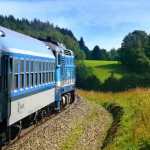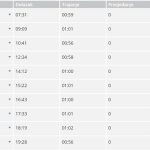Croatian Railways is building 400 kilometers of high-speed track and trains on several key routes will be running at speeds of up to 160 km/h within 10 years. The average speed of a current Croatian train is only 58.2 km/h! Only Serbia, Bosnia and Montenegro have railway systems worse than ours.
However, December has proven to be the month of railways when it comes to major projects in this area of Croatian infrastructure, according to Krešimir Žabec/Jutarnji List on December 30, 2019. For years, there have been reports of billions of euros coming to Croatia to upgrade our catastrophic rail network.
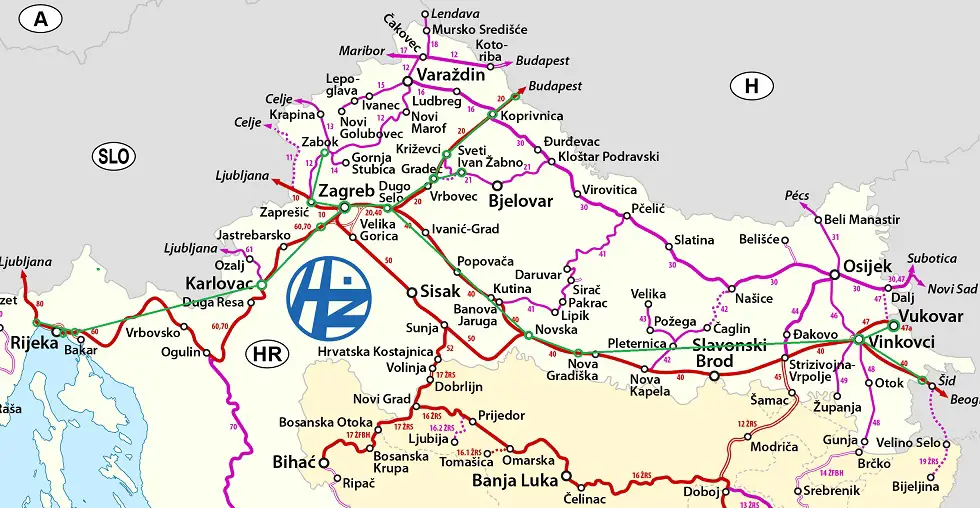
Map of Current and Upcoming Croatian Railways High-Speed Projects | Croatian Railways
Average Speed of Current Croatian Train: 58.2 km/h
The state of railway infrastructure in Croatia is perhaps best illustrated by the indicator of 58.2 kilometers per hour, which is the average speed of trains running in Croatia. Only Serbia, Bosnia and Montenegro have railway systems worse than ours. But until recently, promises of a brighter future for Croatian Railways have sounded like the dreams of politicians which never produced any visible results. However, a turnaround began to take hold this past month.
First New Railway Line in 50 Years Launched in December 2019
First, after 50 years, a new railway line was launched in Croatia: from Gradec to Sveti Ivan Žabno. Then, in Vukovar, a contract was signed with the Spanish company Comsa to upgrade and electrify the Vinkovci – Vukovar railway. Eight years after its launch; the Turkish company Cengiz was selected as contractor for the Križevci – Koprivnica – Hungarian Border section of the project. And a 321 million EUR contract was finally signed to build the Lowland Railway section of Hrvatski Leskovac to Karlovac, which is being co-financed by the European Union.
Three Billion EUR Investment in Croatian Railways
Croatia, the European Union and the World Bank are expected to invest more than 3 billion EUR in designing, renovating and upgrading Croatian railway infrastructure over the next ten years. There are 18 projects in different stages of progress, of which only the Gradec – Sv. Ivan Žabno line has been finished.
Overview of the 250-Kilometer Lowland Railway Project
The international Mediterranean railway corridor connects Rijeka with the Baltic. The Croatian part of this corridor is divided into a section from Zagreb to Rijeka, known as the Lowland Railway, and the section from Zagreb to Botovo (the Hungarian border). It is a 250-kilometer railway line, and only 22 kilometers, from Zagreb to Dugo Selo, are currently two-lane and have been electrified. The estimated value of the modernization and construction of this route is approximately 2.6 billion EUR, and that tab does not include the cost of modernizing the Zagreb hub.
The other sections of this route are in different stages of completion. Work on the 38.2-kilometer Dugo Selo – Križevci section is underway and running about two years behind schedule.
The contract for co-financing and a tender for a contractor have been signed for the section from Hrvatski Leskovac to Karlovac.
Two Options for Most Expensive Lowland Span: Karlovac – Škrljevo
The Hrvatski Leskovac – Karlovac section is connected to the most difficult and expensive span, running from Karlovac to Škrljevo, which is about 150 kilometers long. Construction costs could reach 1.5 billion EUR, but he total cost of will depend on whether the Northern or Southern option is selected. Kupska, the Northern option, is 150 kilometers long, of which 61 kilometers involve tunnels and bridges. Drežnička, the Southern option, is 170 kilometers long with 45 kilometers of tunnels and bridges.
It is unknown at this time whether this section will be put into concession or the European Commission will decide to co-finance the project, due to concern over utilizing Chinese capital. EU funding for Croatia is a more favorable option as it won’t impact public debt. In the event of a concession, a Chinese company would build and finance the project, backed by state guarantees of around 1.5 billion EUR. And it would be difficult for the Croatian state to allow that.
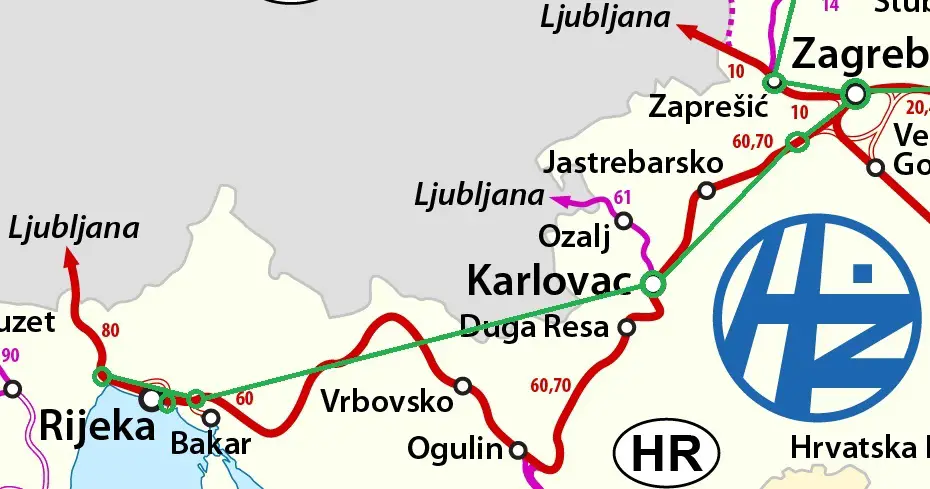
Close-Up of the Zagreb – Hrvatski Leskovac – Karlovac – Škrljevo – Rijeka – Jurdani Line | Croatian Railways
Location Permit and Plans for Škrljevo – Rijeka – Jurdani Section
A location permit has been obtained for the Škrljevo – Rijeka – Jurdani section and the main plans are being drawn, and are being co-financed by the EU with 8.5 million EUR. A final solution is currently being worked on for the Zagreb hub. According to projections, the entire Lowland Railway could be completed by 2030.
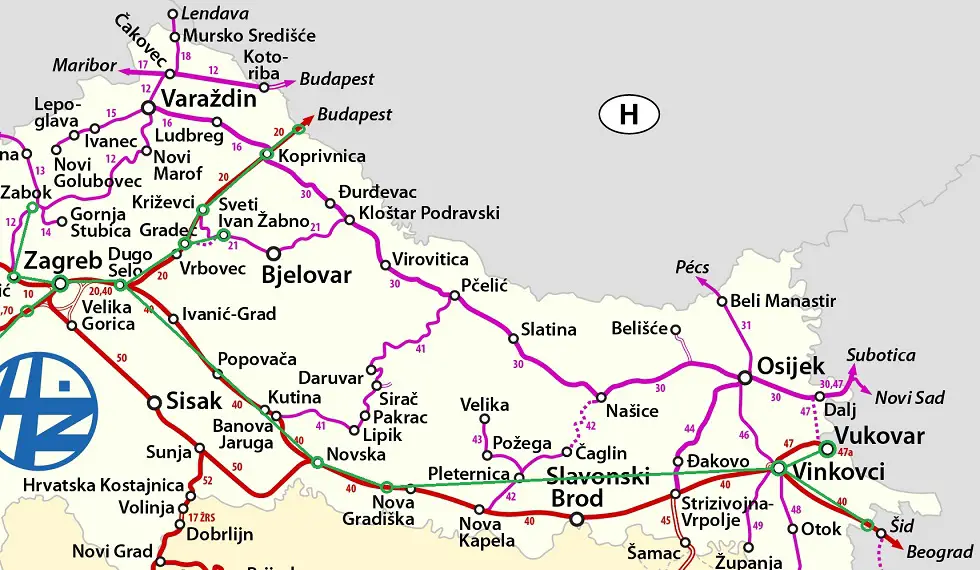
Close-Up of Railway Line Upgrades to Hungary and Serbia | Croatian Railways
Work Progressing on the Zagreb – Serbian Border Railway
Another important international route is railway from Zagreb to the border of Serbia. The sections of Vinkovci – Tovarnik – Serbian Border and Okučani – Novska have been modernized and plans reconstruction and upgrade of the Dugo Selo – Novska section are underway. The estimated price tag for work on this section is 580 million EUR. Project plans for the modernization of the Okučani – Vinkovci section are also in development.
In addition to the construction of the Dugo Selo – Križevci section, two more projects are underway. As part of the modernization and electrification of the Zaprešić – Čakovec railway, work is progressing on the Zaprešić – Zabok section.
Zagreb and Rijeka Port Hubs Undergoing Upgrades
The railway network within the greater Zagreb metropolitan area plays a crucial role in passenger transport. The value of this project, which is being carried out by the Swietelsky construction firm, is estimated at 529 million EUR, with a planned completion date of 2021.
Another important project is the reconstruction and capacity expansion of the Rijeka Brajdica freight railway station.
This project includes the complete reconstruction of the existing nine tracks and the extension of the Sušak railway tunnel to a length of 423 meters. The total value of this project is 35.6 million EUR. This project is extremely important for expanding the capacity of the Port of Rijeka.
Along with these and a few other projects in the upcoming ten years, Croatia is expected to finally upgrade its railway infrastructure. As mentioned in an earlier TCN article, these upgrades will allow train passengers to travel at speeds of 160 kilometers per hour.
Croatian Railways Project Overviews:
Here is an overview of six key railway projects; their statuses and expected dates of completion:
Dugo Selo – Križevci:
Length: 38.2 kilometers
Details: Upgrade of the existing track and construction of the second track.
Contractors: Zagreb Montaža, DIV, Dalekovod Integral
Completed: 65 percent of the financial part of the contract.
Deadline: 48 months
Cost: 196.9 million EUR
Križevci – Koprivnica – Hungarian Border:
Length: 42.6 kilometers
Details: Upgrade of the existing track and construction of the second track.
Contractors: Cengiz (Turkey)
Completed: Signing of construction contract in Spring 2020.
Deadline: 48 months
Cost: 400 million EUR
Vinkovci – Vukovar:
Length: 18.7 kilometers
Details: Track upgrade and electrification.
Contractors: Comsa
Completed: Signed construction contract.
Deadline: 24 months
Cost: 55 million EUR
Hrvatski Leskovac – Karlovac:
Length: 44 kilometers
Details: Upgrade of the existing track and construction of a second track.
Contractors: Tender in process.
Completed: EU approved co-financing with 361 million EUR.
Deadline: TBD
Cost: 450 million EUR
Zaprešić – Zabok:
Length: 23.9 kilometers
Details: Railway modernization and electrification.
Contractors: Swietelsky
Completed: In progress.
Deadline: End of 2021.
Cost: 80.8 million EUR
Rijeka Brajdica:
Length: 4 kilometers
Details: Connecting track to the container terminal of Adriatic port.
Contractors: Kolektor and Euro Asphalt
Completed: In progress.
Deadline: 45 months
Cost: 29.5 million EUR
Follow our Travel page for our continuting coverage of high-speed train track upgrades in Croatia. Train schedules, tickets, route maps and news can be accessed on the Croatian Railways site here.



